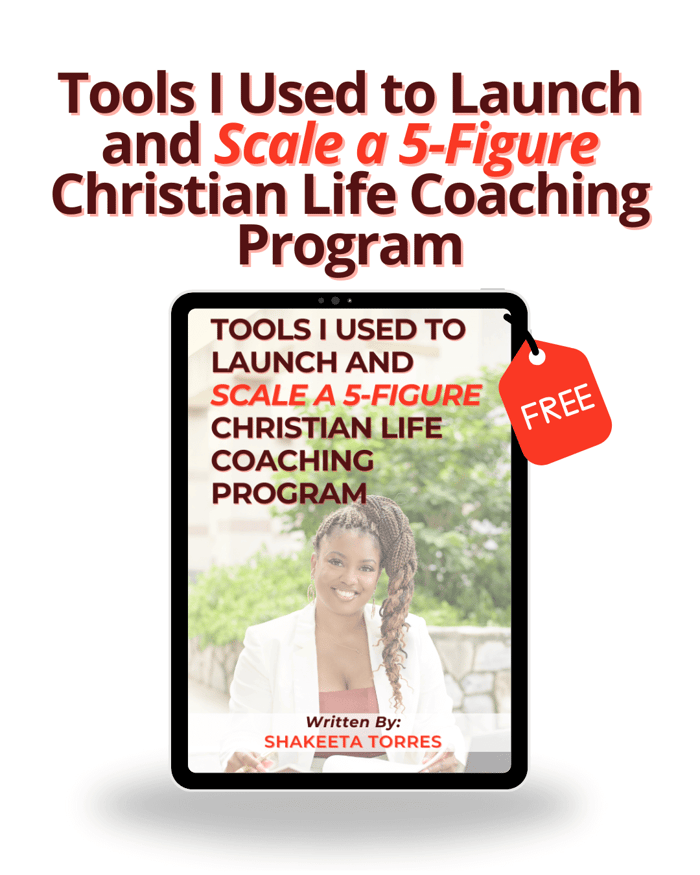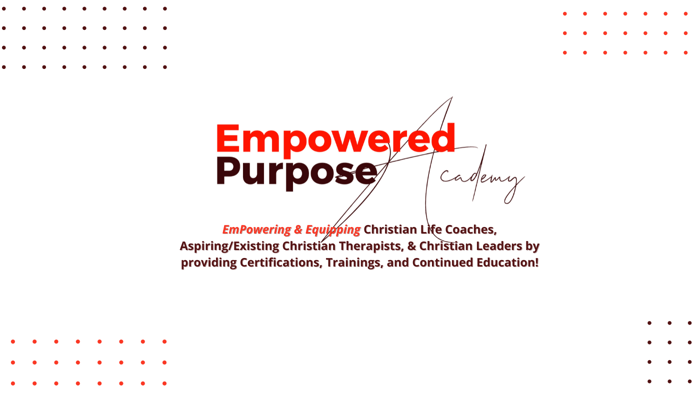Table of Contents
- How Christian Life Coaches Stay Spirit-Led & Professional.
- 🕊️ Introduction: Called by God, Grounded in Excellence
- ✝️ Understanding What It Means to Be Spirit-Led in Coaching
- 🧭 Understanding Your Scope of Practice as a Christian Life Coach
- ⚖️ Why Balance Matters: The Ministry–Marketplace Connection
- 💼 Practical Ways to Stay Spirit-Led and Professional
- 🔥 The Heart Posture: Spirit First, Structure Always
- 🕊️ Real-Life Example: The Spirit-Led Coaching Moment
- 🌱 Maintaining Spiritual Integrity in a Professional World
- 💡 A Word of Wisdom for Faith-Based Coaches
- ✨ Final Takeaway: Flow with Grace, Lead with Excellence
- FAQs
How Christian Life Coaches Stay Spirit-Led & Professional.
How Christian Life Coaches Stay Spirit-Led & Professional
🕊️ Introduction: Called by God, Grounded in Excellence
As a Christian Life Coach, you don’t just help people set goals, you help them align with God’s purpose. Your work bridges the sacred and the practical, the spiritual and the professional.
But with that divine calling comes an important question:
“How do I stay Spirit-led while remaining professional and within my coaching scope of practice?”
It’s a question many Christian Life Coaches wrestle with. You want to allow the Holy Spirit to guide your sessions and uphold professional ethics, boundaries, and credibility.
The truth is, you don’t have to choose between the two. You can flow in the Spirit and still operate with structure. This balance isn’t compromise; it’s stewardship.
Christian life coaches have the unique privilege of guiding others toward purpose while reflecting God’s character in every conversation. Let’s explore how to walk in divine wisdom, maintain excellence, and honor God and your clients in your coaching practice.
✝️ Understanding What It Means to Be Spirit-Led in Coaching
Being Spirit-led doesn’t mean abandoning professionalism or discernment. It means partnering with the Holy Spirit to bring clarity, comfort, and conviction in alignment with truth.
When you’re Spirit-led as a Christian Life coach:
✅ You listen deeply—not just to your client, but to God’s gentle nudges.
✅ You discern when to speak, when to ask, and when to pause.
✅ You remain sensitive to the client’s emotional, spiritual, and personal boundaries.
✅ You remember that you’re a vessel, not the source.
Romans 8:14 reminds us, “For those who are led by the Spirit of God are the children of God.” This verse grounds us in identity—our leadership as coaches is first spiritual before professional, but it’s never reckless.
The Holy Spirit empowers you with wisdom, empathy, and strategy. Yet He also expects you to use sound judgment and respect the boundaries of your role.
🧭 Understanding Your Scope of Practice as a Christian Life Coach
Before you can balance Spirit and structure, you need clarity on what “scope of practice” really means.
Your scope of practice defines what you are and are not qualified and legally permitted to do as a coach. It helps protect you and your clients from harm or confusion.
For Christian life coaches, understanding this scope is vital, it helps you maintain integrity while still creating space for the Holy Spirit to move powerfully.
As a Christian Life Coach, your role includes:
✅ Helping clients set goals and take Spirit-led action.
✅ Offering accountability, encouragement, and mindset support.
✅ Guiding clients to explore their values, vision, and purpose.
✅ Supporting spiritual growth through prayer, reflection, and biblical principles (if agreed upon by the client).
But your role does not include:
Diagnosing or treating mental health conditions — Leave clinical or psychological assessments to licensed professionals.
Offering therapy or clinical counseling (unless you’re licensed) — Coaching supports growth, not mental health treatment.
Giving prophetic direction that overrides a client’s free will — Clients should always have the freedom to make their own choices.
Speaking for God in ways that manipulate or pressure — Ethical Christian life coaches honor God while respecting client boundaries.
When you stay within these boundaries, you honor both your calling and your credibility. You make room for the Spirit to move without crossing ethical lines that could cause confusion or harm.
⚖️ Why Balance Matters: The Ministry–Marketplace Connection
Coaching is both ministry and marketplace. It’s sacred work done in a structured environment.
Christian life coaches operate at the intersection of ministry and marketplace, demonstrating that faith and professionalism can thrive together.
Jesus modeled this balance perfectly. He moved in power, yet with profound order and clarity. He prayed before acting, gave clear instructions, and always honored people’s agency.
As a faith-based coach, your professional boundaries are not barriers to the Spirit—they’re containers that allow His presence to flow safely and effectively.
Think of your policies, contracts, and boundaries as the “wineskins” (Matthew 9:17) that preserve the new wine of your calling. Without those boundaries, the anointing can leak through disorder or burnout.
💼 Practical Ways to Stay Spirit-Led and Professional
Here are a few practical ways Christian Life Coaches can stay true to both their faith and their professional standards.
1. Start Every Session with Prayer and Permission
Ask your client if they’re comfortable with prayer at the beginning or end of a session. This establishes mutual respect and gives the Holy Spirit room to guide.
Example: “Would you like us to open with a short prayer for clarity and peace as we begin today’s session?”
This keeps the experience consensual, honoring the client’s faith journey without assuming their comfort level.
2. Invite the Holy Spirit into Preparation—Not Just the Session
Being Spirit-led doesn’t start when the Zoom call begins—it starts in your quiet time.
Ask the Holy Spirit to give you insight, patience, and discernment before each session.
Many Christian Life Coaches find it helpful to journal quick prayers like:
“Holy Spirit, help me to listen deeply, to ask wise questions, and to see this person as You see them.”
This pre-session posture prepares your heart to lead from grace, not pressure.
3. Use Scripture as Principle, Not Prescription
The Word of God is foundational, but use it as a tool of truth, not control.
Share Scripture when it aligns with the client’s goals or situation, but avoid using it to diagnose or prescribe.
Instead of saying, “God says you must quit that job,”
You might say, “Let’s reflect on how this decision aligns with God’s peace and your long-term vision.”
This approach invites the client to seek God’s confirmation for themselves—building ownership, not dependency.
4. Clarify Your Coaching Role Early
Your client agreement or intake form should clearly state that coaching is not therapy or counseling.
This not only protects you legally but also sets healthy expectations.
Example disclaimer:
“As your coach, I’ll help you gain clarity, build confidence, and take Spirit-led action steps. Coaching is not a substitute for counseling, therapy, or medical care.”
When you define your lane, you can operate freely within it without fear of overstepping.
5. Stay Accountable Through Mentorship or Supervision
Even the most seasoned coaches need guidance. Surround yourself with mentors, accountability partners, or a coaching supervisor who understands both spiritual and ethical dynamics.
Proverbs 11:14 reminds us: “Where there is no guidance, a people falls, but in an abundance of counselors there is safety.”
Accountability ensures you stay sharp, humble, and in alignment.
6. Keep Learning—Spiritually and Professionally
True excellence requires ongoing development. Attend faith-based coaching trainings, ethics workshops, and spiritual retreats that sharpen both skill and discernment.
As 2 Timothy 2:15 says: “Do your best to present yourself to God as one approved, a worker who does not need to be ashamed and who correctly handles the word of truth.”
Your growth glorifies God. The more you learn, the more you can serve from a place of wisdom and integrity.
🔥 The Heart Posture: Spirit First, Structure Always
Being Spirit-led doesn’t mean being spontaneous all the time, it means being surrendered.
You can still use coaching frameworks, structured programs, and session notes while remaining sensitive to the Spirit’s direction.
God is a God of order (1 Corinthians 14:40).
That means order and anointing can coexist beautifully.
The Holy Spirit is not limited by structure; He thrives in environments of integrity, peace, and clarity.
Your professionalism is not a restriction—it’s a witness.
It shows that you take your calling seriously and that your faith informs excellence, not chaos.
🕊️ Real-Life Example: The Spirit-Led Coaching Moment
Imagine this: You’re in a session, and your client begins sharing a struggle that suddenly stirs something in your spirit. You sense the Holy Spirit highlighting a deep root or belief.
Instead of immediately declaring, “God told me this about you,” pause and reflect.
You might say:
“Something you said stood out strongly to me. Would it be okay if I shared what I’m sensing?”
This approach maintains professionalism and consent while still allowing the Spirit to minister. It shifts the moment from authority over to partnership with—which is where true transformation happens.
🌱 Maintaining Spiritual Integrity in a Professional World
In today’s coaching industry, professionalism is part of your witness. Clients should see you as both credible and compassionate, Spirit-led and self-controlled.
Here are three core values to uphold:
Integrity: Keep promises, respect confidentiality, and honor boundaries.
Excellence: Deliver your services with consistency and care.
Discernment: Know when to refer out to a counselor, pastor, or specialist.
These values create a coaching environment where the Spirit can move freely without confusion or compromise.
💡 A Word of Wisdom for Faith-Based Coaches
God doesn’t ask you to choose between Spirit and structure. He calls you to steward both.
Your coaching practice is a ministry and a mission field. When you operate in professionalism, you reflect the character of the God who called you.
Let this truth anchor you:
“Whatever you do, work at it with all your heart, as working for the Lord, not for human masters.” – Colossians 3:23
Being Spirit-led is not the opposite of being professional—it’s the foundation of it.
When you move with discernment, prayer, and purpose, you become both Spirit-filled and skillful.
Christian life coaches who embrace both spiritual sensitivity and professional discipline create lasting impact—transforming lives while honoring God.
✨ Final Takeaway: Flow with Grace, Lead with Excellence
Balancing being Spirit-led and professional isn’t a tightrope—it’s a partnership.
When you yield to the Holy Spirit and uphold your professional standards, you demonstrate maturity, wisdom, and honor.
Remember:
The Holy Spirit gives revelation; professionalism gives reliability.
Prayer brings clarity; policies bring peace.
Boundaries protect the anointing.
So pray before you plan. Listen before you lead. And above all, coach with humility, integrity, and grace.
📘 Next Step for You
If you’re ready to grow as a Spirit-led coach without compromising professionalism, download my free guide:
“Tools I Used to Launch and Scale a 5-Figure Christian Life Coaching Program.”
It will help you:
✅ Define your spiritual and professional boundaries.
✅ Build confidence in your calling.
✅ Create a coaching practice rooted in both excellence and anointing.
Because when your structure honors God, your anointing flows freely and your coaching transforms lives.
 CLICK HERE FOR YOUR FREE GUIDE
CLICK HERE FOR YOUR FREE GUIDE
FAQs
1. What does it mean to be a Spirit-led Christian life coach?
Being a Spirit-led Christian life coach means partnering with the Holy Spirit to guide your coaching sessions with wisdom, compassion, and discernment. It’s about listening to both your client and God’s gentle direction. A Spirit-led coach helps clients align with biblical principles and purpose without overstepping into roles like counseling or prophecy.
2. How can Christian life coaches stay professional while being Spirit-led?
Christian life coaches can stay professional by setting clear boundaries, maintaining client confidentiality, and obtaining informed consent for prayer or spiritual guidance. Professionalism doesn’t hinder the Spirit, it protects the flow of His work. When you blend structure with sensitivity, you model excellence and integrity while allowing the Holy Spirit to move freely.
3. What is the scope of practice for a Christian life coach?
A Christian life coach helps clients set goals, grow spiritually, and take action aligned with God’s purpose. However, coaches should not diagnose mental health conditions, offer therapy, or give prophetic instructions that remove a client’s free will. Staying within this scope protects both the coach and client, ensuring clarity, trust, and accountability in every session.
4. How can I invite the Holy Spirit into my coaching sessions professionally?
You can invite the Holy Spirit into your coaching by starting each session with prayer—only after getting your client’s permission. Ask the Spirit for discernment, peace, and clarity before sessions during your private time with God. Remember, His guidance begins in your preparation, not just in the session itself.
5. Why are boundaries and ethics important for Christian life coaches?
Boundaries and ethics reflect God’s order and wisdom. They create a safe space for both you and your client, ensuring that ministry and professionalism coexist. When you honor contracts, stay within your lane, and refer clients when needed, you demonstrate integrity—and your excellence becomes a witness of your faith in action.







